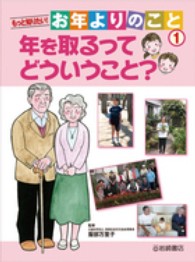- ホーム
- > 洋書
- > 英文書
- > History / World
Full Description
Over the past 25 years, Rwanda has undergone remarkable shifts and transitions: culturally, economically, and educationally the country has gone from strength to strength. While much scholarship has understandably been retrospective, seeking to understand, document and commemorate the Genocide against the Tutsi, this volume gathers diverse perspectives on the changing social and cultural fabric of Rwanda since 1994. Rwanda Since 1994 considers the context of these changes, particularly in relation to the ongoing importance of remembering and in wider developments in the Great Lakes and East Africa regions. Equally it explores what stories of change are emerging from Rwanda: creative writing and testimonies, as well as national, regional, and international political narratives. The contributors interrogate which frameworks and narratives might be most useful for understanding different kinds of change, what new directions are emerging, and how Rwanda's trajectory is shaped by other global factors.
The international set of contributors includes creative writers, practitioners, activists, and scholars from African studies, history, anthropology, education, international relations, modern languages, law and politics. As well as delving into the shifting dynamics of religion and gender in Rwanda today, the book brings to light the experiences of lesser-discussed groups of people such as the Twa and the children of perpetrators.
Contents
Introduction
Hannah Grayson and Nicki Hitchcott
Rwanda is Not Hotel Rwanda
Malaika Uwamahoro
Part One: A Changing Nation
'Memory-Traces' in the Works of Felwine Sarr and Bruce Clarke: What Stories of Change Can Commemorate the Genocide Against the Tutsi?
Eloïse Brezault
Competing Narratives and Performances in Rwanda's Gacaca Courts
Ananda Breed and Astrid Jamar
Human Rights Reporting on Rwanda's Gacaca Courts: a Story of Stagnation and Failure
Benjamin Thorne and Julia Viebach
The Incorporation of Women in Rwandan Politics
Louise Umutoni-Bower
Re-branding Rwanda's Peacekeeping Identity during Postconflict Transition
Georgina Holmes and Ilaria Buscaglia
One Rwanda for all Rwandans': (Un)Covering the Batwa in Post-Genocide Rwanda
Meghan Laws, Richard Ntakirutimana and Bennett Collins
Part Two: Changing People
Writing as Reconciliation: Bearing Witness to Life After Genocide
Catherine Gilbert
Decolonizing Trauma Therapy in Rwanda
Caroline Williamson Sinalo
Promising Generations: From Intergenerational Guilt to Ndi Umunyarwanda
Richard M. Benda
Imbabazi, Kwicuza & Christian Testimonials of Forgiveness
Madelaine Hron
Stories as Change: Using Writing to Facilitate Healing Among Genocide Survivors in Rwanda
Laura Apol





